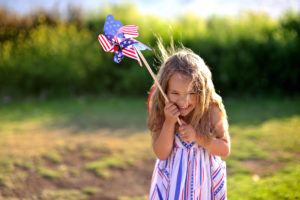 The Fourth of July and election season are upon us, and political communications are becoming more and more present in our lives.
The Fourth of July and election season are upon us, and political communications are becoming more and more present in our lives.
Your child probably has begun to notice campaign stickers, television commercials, and news coverage about the election. He might already be asking questions such as, “Who is the president?”, “What does the president do?” or “Why do people vote?”
With all this going on, now is a great time to engage children in age-appropriate discussions and activities about democracy and patriotism. They will begin to appreciate that people may have different opinions, but we all have a voice in our country’s future.
As our preschoolers progress through our curriculum, they will learn about similarities and differences among countries and cultures. Below are some of our classroom activities that focus on specific U.S. traditions, as well as activities you can do with your child at home.
BEGINNERS (ages 2-3):
- In the classroom: Our Beginner students sing patriotic songs and learn that the Fourth of July is America’s birthday. They practice recognizing and naming the colors and shapes on the American flag.
- At home: Take a drive or walk with your child. Point out the American flag and ask him to name the colors of the stars and stripes. Ask him to teach you a patriotic song that he learned in class.
- Recommended songs: “Yankee Doodle” and “You’re a Grand Old Flag”
INTERMEDIATES (ages 3-4):
- In the classroom: Voting is a common practice in our Intermediate classrooms. Students learn that everyone has an opportunity to vote, and that the choice with the most votes wins. They vote to determine songs to sing, books to read, and games to play.
- At home: Allow your child to vote on family decisions, such as what to eat for dinner or what to do on the weekends. Remind him that everyone in the family gets to vote.
- Recommended songs: “My Country Tis of Thee” and “America the Beautiful”
PRE-K/PRE-K 2 (ages 4-5):
- In the classroom: Our older preschoolers recognize national symbols such as the White House, the American flag, the Statue of Liberty, and the bald eagle. They also learn the meaning of freedom, talk about the roles of the president, and identify patterns on the flag.
- At home: Reinforce to your child that the president is in charge of our country, just like a principal is in charge of a school. Encourage him to write down what he would do if he were president. Ask him to share his ideas with you.
- Recommended songs: “The Star Spangled Banner” and “This Land is Your Land”
By exposing preschoolers to U.S. government and traditions, they gain a sense of pride in their country and a better understanding of the world around them.
– Lauren Starnes, PhD – Director of Early Childhood Education

July Newsletter 2016
From Our Principal
So many fun things have happened already, and we are only in the 3 week of summer camp! We can’t wait to see what the rest of the summer brings! Please make sure you check our calendar for any special events and updates!!
July 4………………………………………………………………………………………………………………………… Closed
July 5/6…………………………………………………………………………………………………………………….. Group 5 and 6 to the Pool
July 8, 15, 22, 29………………………………………………………………………………………………………… Water Play and Kona Ice
From Our Education Department
Introducing Democracy & Patriotism to Preschoolers
Your child probably has begun to notice campaign stickers, television commercials, and news coverage about the election. He might already be asking questions such as, “Who is the president?”, “What does the president do?” or “Why do people vote?”
With all this going on, now is a great time to engage children in age-appropriate discussions and activities about democracy and patriotism. They will begin to appreciate that people may have different opinions, but we all have a voice in our country’s future.
As our preschoolers progress through our curriculum, they will learn about similarities and differences among countries and cultures. Below are some of our classroom activities that focus on specific U.S. traditions, as well as activities you can do with your child at home.
BEGINNERS (ages 2-3):
INTERMEDIATES (ages 3-4):
PRE-K/PRE-K 2 (ages 4-5):
By exposing preschoolers to U.S. government and traditions, they gain a sense of pride in their country and a better understanding of the world around them.
– Lauren Starnes, PhD – Director of Early Childhood Education